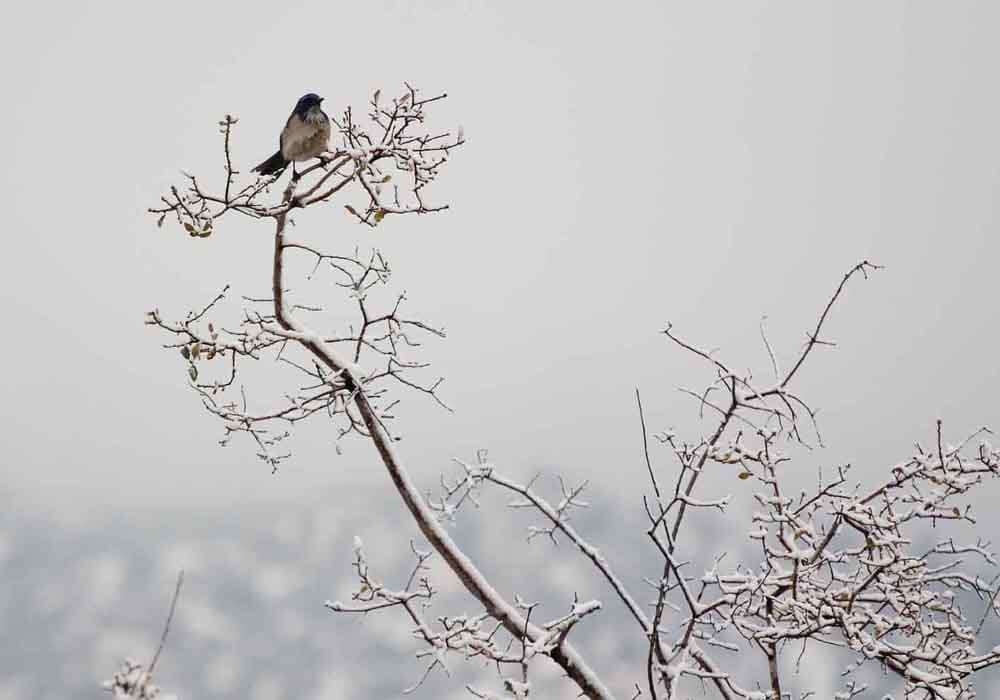Why Are Birds Chirping
at Night in Winter?
On a typical day, birds come out to impress a mate, mark their territory, and communicate with one another. However, chirping birdsong is most commonly associated with the daylight hours in the summer months. So why are birds chirping at night in winter, even after the sun has set?
Birds sometimes chirp at night in the winter because urbanization of once rural areas has caused birds to change their habits. Artificial lighting, noise pollution, and changes in migratory patterns due to global warming have all led to birds chirping all year long, even after the sun goes down.
Despite what many people think, birdsong in the middle of the night is not a new phenomenon. The Beatles sang about a "Blackbird singing in the dead of night" in 1968. This article will explore why you are noticing the familiar sound of a spring morning in the dead of the winter night.

Artificial Lighting in Cities Is Confusing the Birds
Light Pollution Interrupts a Bird's Circadian Rhythm
Circadian rhythms are the body's internal 24-hour clock. You and I have them, and birds are no different.
However, much like your sleep would be interrupted if someone kept switching the light on in your bedroom, birds that nest by street lamps, apartment buildings, or busy roads may not be able to tell the difference between night and day, causing them to sing throughout the night.
Some Birds Are Far More Sensitive to Light Changes Than Us
Research suggests that some birds will detect changes in the light much more sensitively than humans, mistaking small changes in light levels as the beginning of dawn. This can trigger a dawn chorus as early as 2 am. Some studies have even concluded that birds can see UV light and are responding to light that we can't see ourselves when they suddenly call out in the middle of the night.
Noise Pollution Can Impact Birdsong Patterns
To a bird living in the countryside, any loud noises in at night are a sign of danger. Birds living in urban environments are often alerted to danger in the middle of the night by the noises of the city and call out to warn other birds of the same threat.
Loud Noises Are Often Perceived by Birds as a Threat
Wintertime can be one of the loudest times of the year, especially after dark. Not only does it get dark earlier, increasing human activity at night, but it is also peak time for holidays and festivals that generate especially loud noises that scare birds.
During the holiday season, loud noises and displays that run through the night can cause disruption to birds, and there are plenty of excuses for fireworks displays, which are known to be distressing to wildlife.
Birds Are Speculated To Adapt Their Routine To Be Heard Better
There have been theories among ornithologists that birds living in particularly noise-polluted areas have adapted well enough to know that their usual song won't be heard by other birds during active hours for people. This has led them to call out to one another in the middle of the night when they won't be interrupted by big celebrations or heavy traffic.
Nocturnal Birds Are Arriving Earlier and Leaving Later
Many birds associated with nocturnal singing are most commonly seen around spring and summer. An example of this would be the nightingale. However, the nightingale can now be seen from as early as January, which is why you may hear their call while it is still pretty cold outside.
Scientists Think Birds Are Adapting Their Migration Patterns
A working theory among professionals is that birds migrate earlier in the year due to climate change and changing light levels. It is thought that the longer days in January can trigger birds with confused light sensitivity to believe that it is time to migrate, causing several early spring arrivals.
They also predict that birds are adapting to global warming. Birds that spend winter near the equator before migrating to enjoy the Northern Hemisphere's cooler summers, like the swallow, are opting to spend more of the year in the north as global temperatures rise.

Why Do Birds Chirp? Are they communicating something? Just being social? Gossiping about the new bird in town? Learn all about the 5 reasons they do so in our article!
Some Birds Just Like To Sing
Several birds have a beautiful song, and they want to sing it. Research suggests that some birds sing in the winter to perfect their tunes in time for the spring mating season, while others just enjoy singing.
There are plenty of birds out there that enjoy a spontaneous sing-song, meaning you are still likely to hear them even if they have no reason to be singing.
Why Are Birds Chirping At Night In Winter
Final Thoughts...
Birds may be active at night during winter for the following reasons:
- Increased light pollution
- Increased noise pollution
- Climate change
- Because they just enjoy singing
Many of the reasons birds chirp at night during the winter can be attributed to human activity. We share our environment with birds, which are affected by any changes we make to that environment. So the next time you hear a bird singing outside in the middle of the night, take pity on the thing.
It probably thinks it's morning and certainly has no idea it’s waking you up in the middle of the night.
Back To The TOP Of This
Why Are Birds Chirping At Night In Winter Page

About the Author...
Richard Worden, a dedicated bird lover for over 20 years, I love to share my in-depth knowledge and passion for birds. Read more About Me and my expertise in this field.
- We Know Birds HOME ›
- Bird Behavior Facts and Information ›
- Why Are Birds Chirping At Night In Winter?



